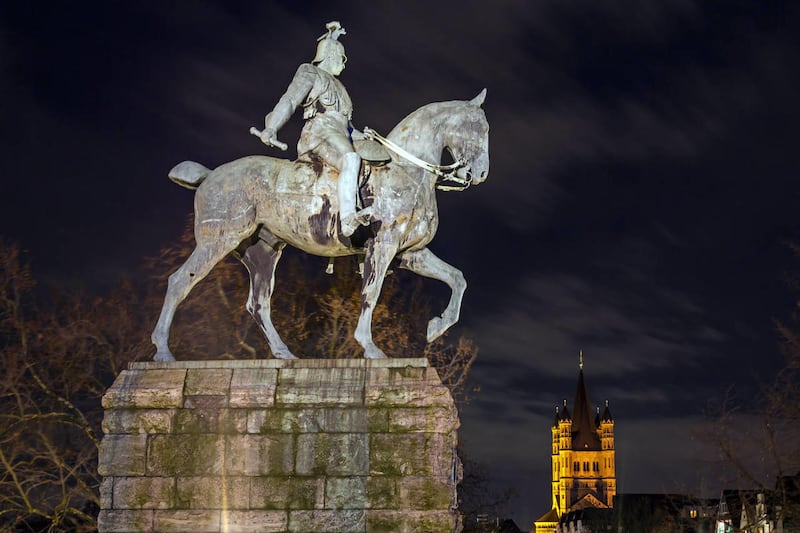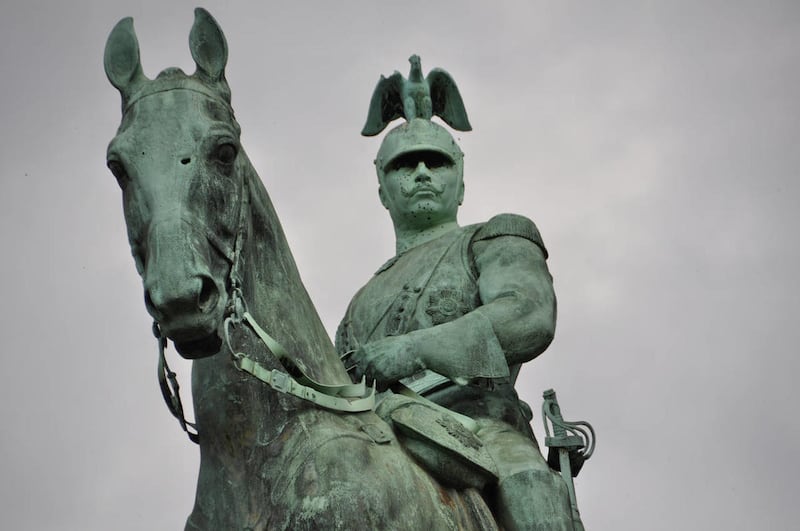The German emperor Kaiser Wilhelm II abdicated his throne on Nov. 9, 1918. As the tide of World War I turned against the Germans, Wilhelm faced the stark reality that his hold on power was no longer tenable.
With the death of his father, Frederick III, in 1888, Wilhelm ascended to not only the imperial German crown but also the traditional title of the ranking Hohenzollern heir, king of Prussia. For over a quarter of a century Wilhelm's rule had been peaceful, though marked by repeated international crises that often threatened a general European war. The war finally arrived in 1914 when the Austro-Hungarian heir and Wilhelm's friend, Franz Ferdinand, was shot in Sarajevo. The heir's assassination set in motion a series of events that led to the outbreak of World War I.
Wilhelm, who had frequently and often disastrously insisted upon guiding German foreign policy before the war, suddenly took a back seat in leadership of the war effort, often deferring to his generals. With the appointment of Field Marshal Paul von Hindenburg and Gen. Erich Ludendorff as his Army chief of staff and First Quartermaster General respectively in 1916, Wilhelm ceded almost total control of the government. The German empire, always strongly militarist, now operated as a military dictatorship with Wilhelm as its figurehead.
Despite Russia's capitulation and surrender of huge swathes of territory to Germany in the Treaty of Brest-Litovsk in early 1918, the German empire was on its last legs by late summer. Ludendorff's promised war-winning spring offensives had stalled after early gains, while shortages plagued the German home front. In contrast, Britain and France had access to virtually unlimited supplies via the United States, and roughly one million American troops had arrived in France with another million on the way.
By early October, realizing the increasing hopelessness of continued German resistance and viewing U.S. President Woodrow Wilson's Fourteen Points as a basis for a negotiated peace, Wilhelm appointed Prince Maximilian of Baden to the post of imperial chancellor. Prince Max soon exchanged several letters with Wilson, who insisted that the Allies would not negotiate with the German government so long as Wilhelm remained at its head. The Allies insisted on a government truly representative of the German people.
By late October, Wilhelm had decided to sack the increasingly unpopular Ludendorff. He then appointed Gen. Wilhelm Groener to fill his post. Groener had been dealing with the task of trying to integrate the chaotic Ukraine into Germany's economic sphere. (The hope had been that Ukraine grain and resources could bolster the war effort). Transferred now to army high command headquarters at Spa, Belgium, Groener was demoralized with what he found.
In the book, “The German High Command at War: Hindenburg and Ludendorff conduct World War I,” historian Robert B. Asprey wrote: “A tour of the front convinced (Groener) that total defeat was very close. Many divisions had battalion strengths of only two or three hundred men or less; numerous units had no officers. The enemy was advancing in almost all sectors and would probably break through before the army could withdraw ... Bulgaria had already laid down her arms, Vienna and Constantinople had requested armistices.”
Additionally, when the admirals of Germany's High Seas Fleet ordered their ships to make one last glorious attack upon Britain's Royal Navy, sailors at Kiel mutinied and started to riot. Communists had already seized control of much of Munich and proclaimed a “worker's republic.” Many believed that if the government did not end the war soon, civil war might break out. When Groener reported to Prince Max in Berlin the general told the chancellor that the war must end immediately. Prince Max appointed a delegation to meet with the French for peace talks, and both he and Groener agreed that Wilhelm must abdicate.
Having joined the army in Spa, Wilhelm initially refused the notion of abdication, stating, “A successor of Frederick the Great does not abdicate.” Increasingly, there was fear that Wilhelm's own bodyguards could not be trusted. Groener believed the best thing for Wilhelm to do would be to seek his death leading his troops in battle. If only wounded, perhaps the kaiser would find sympathy among his subjects.
In his book, “Wilhelm II, Volume II: Emperor and Exile, 1900-1941,” biographer Lamar Cecil wrote, “On 8 November ... at (Wilhelm's) customary morning conference that day with Hindenburg and Groener, he ordered them to prepare the assembling of a force 'for the reconquest of the homeland' to march under his command. Wilhelm seemed to think that his presence alone would galvanize the Germans and overthrow the revolution, and he continued to reject, calmly but firmly, Max's entreaties by telephone that he abdicate.”
Finally, on Nov. 9, Hindenburg and Groener reported to the kaiser that there was no choice — he must step down. He was too unpopular at home, and the Allies would not negotiate with his government. Unwilling to give up all of his power, Wilhelm stated that he would abdicate his crown as German emperor, but he would retain his title as king of Prussia. The imperial constitution, however, inextricably linked the two offices, and such a compromise simply could not work.
As Wilhelm debated his course of action with his entourage at Spa, a call arrived from Berlin. Acting entirely on his own authority, Prince Max had stated publicly that Wilhelm had abdicated his titles. Germany's largest political party, the Social Democrats, now took power with Prince Max's blessing. In Berlin, Social Democratic leaders had proclaimed the foundation of a German republic.
Wilhelm saw this as nothing less than a coup, and ranted for some time. Ultimately, however, he was forced to concede that he had no support at home or with the army. Reluctantly, and believing those around him acted disloyally, he agreed to the abdication and decided that he would head for Holland, where his contacts insisted he could find asylum.
While initially conveyed toward Holland in a train, fear of German revolutionaries prompted Wilhelm's party to switch to automobiles. Not long after his arrival in Holland the German minister there, Friedrich Rosen, met his friend, the deposed kaiser. Cecil notes their exchange:
“ 'I am a broken man,' Wilhelm told his old acquaintance. 'How can I start again in life? There is no hope left for me and nothing remains for me save despair.' The inventive Rosen suggested that the Kaiser could vindicate himself by writing his memoirs, and Wilhelm, with the characteristic electric change in temperament for which he was notorious, cried out with delight, 'I'll start tomorrow!' ”
Wilhelm lived on in Doorn, Holland, for more than two decades, always keeping a close eye on political developments in Germany, and always hoping he would be called back to reclaim his throne. It proved an unrealistic dream. Few in Germany seriously wanted him back. Even unreconstructed monarchists preferred one of Wilhelm's sons or grandsons to the man who had led Germany into disaster. He did live long enough to witness the German invasion of Holland and Western Europe in 1940. Though critical of Hitler and the Nazis, he delighted in Germany's triumphs and new position in the world. He died in 1941.
Cody K. Carlson holds a master's in history from the University of Utah and teaches at Salt Lake Community College. An avid player of board games, he blogs at thediscriminatinggamer.com. Email: ckcarlson76@gmail.com


